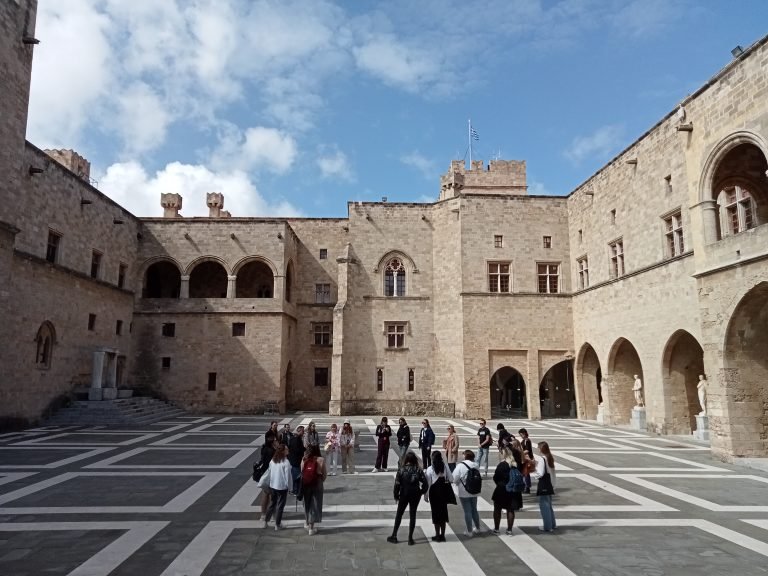“Literature and Human Rights” – that was the topic of the ERUA Travelling Seminar that Sarah Seidel (University of Konstanz) and Kerstin Bönsch (Wieland Foundation) jointly organized this winter semester (2022/2023). After months of preparation, they recently travelled with more than 20 students to Greece for one week, where they worked in a transnational network with Prof. Elena Theodoropoulou & and the Laboratory of Research on Practical Philosophy (L.R.P.Ph., University of the Aegean) whose is the directress. For more information, see here: https://practphilab.aegean.gr/activities/seminars-lectures/). The results of the seminar are currently being developed further for a public exhibition in Biberach (Germany) and for the 3rd International Biennale on Practical Philosophy, organized by the L.R.P.Ph (April 19-23, 2024, University of the Aegean, Rhodes, Greece).
The seminar deals with the “origin” of humanity in texts of the so called Weimarer Classic, asks how freedom is narrated after 1945, while the Declaration of Human Rights was published. Furthermore, it is explored, how human rights were reflected in contemporary literary texts. It is asked how the socio-political discourse on human rights has developed, where the current challenges lie, and how literary texts position themselves in relation to this.
Furthemore, this research was extended and related with Practical Philosophy, through relevant philosophical & literary texts and practices in connection with the arts. The seminar was unfolded in four phases from October 2022 to Juin 2023): 1. Historical Foundation (UKON, Konstanz). 2. Exemplary lectures of contemporary literature (UKON, Konstanz). 3. Practical Philosophy & foreignness (U Aegean/Laboratory of research on Practical Philosophy, Rhodes. For more information, see here: https://practphilab.aegean.gr/). 4. Εxchanges & perspectives – Exhibition in Biberach: Students as designers of artifacts (UKON, Konstanz).
“Freedom of the press is a concern for, and in the interest of, the entire human race”, says Christoph Martin Wieland in his 1785 writing “On the Rights and Responsibilities of Writers”. As a journalist and publisher of the most widely circulated and longest-lived journal of the 18th century, Wieland championed freedom of the press. Today, freedom of the press, or more generally freedom of expression, is anchored in Article 19 of the Universal Declaration of Human Rights.
During the ERUA Travelling Seminar, the two initiators Sarah Seidel and Kerstin Bönsch and their students did not exclusively focus on Wieland and freedom of expression, but additionally examined various aspects of the interplay between literature and law. Topics included religious freedom, human dignity at the end of life, discrimination and identity, work and welfare, freedom of movement and political asylum – to name a few. The participants of the seminar discussed the works of authors such as Johann Wolfgang von Goethe (Iphigenia in Tauris), Heinrich Böll (Erzählungen) and Elfriede Jelinek (Die Schutzbefohlenen).
“Continuing the seminar in Greece enabled us to exchange with people who deal with human rights in their daily work. In addition, we were able to give our topics a new, philosophical perspective. For me, this exchange and change of perspective was a very valuable and lasting experience,” says Sarah Seidel, academic staff member of the University of Konstanz who led the advanced seminar.
In Athens, the students had the opportunity to talk to the director of the NGO Antigone and to gain an insight into the work of the German Embassy. In Rhodes, the students finally examined the topic of literature and human rights from a completely different angle, i.e. through the research project of Prof. Elena’s Theodoropoulou: “Philosophical Objects” (for more information, see here: https://practphilab.aegean.gr/philosophical-objects/) which introduced the German visitors to practical philosophy and its connection withliterary texts and arts stimulating inspiring discussions. Kerstin Bönsch added information on the challenges and possibilities of literature exhibitions, and Sarah Seidel explored additional literary texts.
“Working in a transnational network gives topics an entirely different perspective and I think it’s wonderful that we can now bring the impulses we got in Greece back to Biberach,” says Kerstin Bönsch about the cooperation with the University of Konstanz and the University of the Aegean. The students and the initiators of the Travelling Seminar are currently preparing an exhibition in Biberach that is scheduled to open in fall 2023. Impulses on the topic of “Literature and Human Rights” can already be found at wieland-goes-creative.de (in German) and can be used to prepare for the upcoming exhibition.
Background
The Wieland Foundation and the Department of Literature, Art and Media Studies at the University of Konstanz have been cooperating for more than five years. The partnership has already led to several projects with a literary background that were presented in Biberach: a literary city tour, three publications and – most recently – the video project “Weltbürgertum weiterdenken”.

